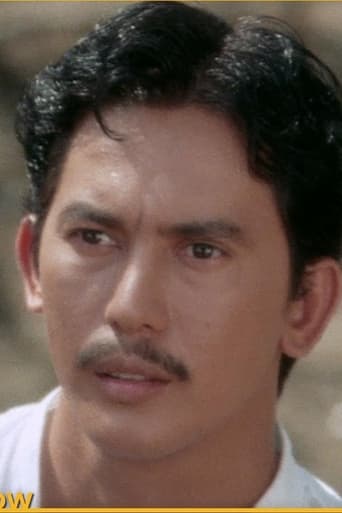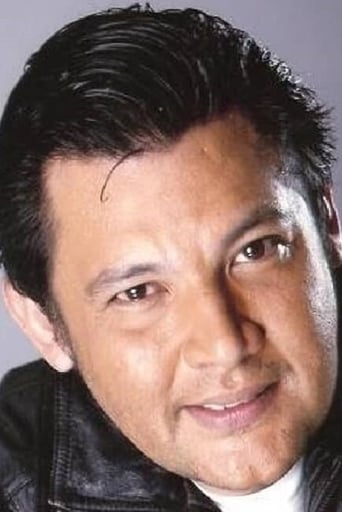Perry Kate
Very very predictable, including the post credit scene !!!
SpunkySelfTwitter
It’s an especially fun movie from a director and cast who are clearly having a good time allowing themselves to let loose.
TrueHello
Fun premise, good actors, bad writing. This film seemed to have potential at the beginning but it quickly devolves into a trite action film. Ultimately it's very boring.
Yazmin
Close shines in drama with strong language, adult themes.
john son
Manila kingpin: The Asiong Salonga Story is written by Lopez Nepomuceno and directed by Tikoy aguiluz, It is an action movie which starred Jorge Estregan (Asiong), Carla Abellana (Angela), Philip Salvador (Policeman), Baron Geisler (Boy Toothpick), among others. Asiong Salonga is the husband of Angela. Even though he is too young to think of it, Asiong wants to rule Manila. But there is the group of Totoy Golem, who is the antagonist. The group of Totoy Golem got angry with Asiong because he stopped the illegal activities of the group. The group of Totoy Golem is known for illegal gambling and drugs. The group was paralyzed. One of the members of Totoy Golem's group was killed by Totoy Golem himself when he learned that the member was spreading the rumor that the group was afraid of Asiong.The setting of the story is in Tondo, Manila. The dialogue of the casts is so frightening. The audience think that the dialogue is only use in street-sides. The special effects of the movie is awesome. Actually, the movie was only a remake of the movie ''Asiong Salonga'' that happened in 1961. Some of the cast was very good in acting but the other cast was needs improvement for his/her acting.5/10
arjayac
If you don't know who's Asiong yet and don't want to read his biography on the web, I won't spoil you. Just know that this movie is only based on him and not 100% real.First of all, I really feel bad for the Philippine Movie Industry. This film has won major movie awards locally and praised for all the wrong reasons. If you're really a fan of Hollywood blockbusters, you'll be disappointedFirst off: "Best in Cinematography". I'm 50/50 on this. There were good camera angles. But since it's in B&W, there were some scenes where I just would like to scream "Turn on the lights!" or "Open some windows!"."Best Editing". Nope. There was one scene where Asiong was crying while reading a letter. And then it cut to a love scene. And then back to him weeping. Editing of the Year, huh?"Best Director". There were a lot of talented actors in this film like John Regala, Baron Geisler, Ronnie Lazaro, Yul Servo, hell, even Ketchup Eusebio. But if you can't help the main character in his acting skills, you don't deserve to win this award. Which brings me to the next one..."Best Actor". I tried. I really tried. At first I was giving him a free pass because maybe it's just because the fight choreography sucked. But then I heard him speak/whisper. And ear excruciating dialog delivery. This man is a half older than the man he tries to portray. He looked like a 50 year old couch potato who tries to look for a 5 minute exercise on the shadow boxing scene. And in terms of facial expressions, he's the male Kristen Stewart of the Philippines. Note to producers: "Just because he portrayed Asiong 21 years ago, doesn't mean he should be him again"."Best Production Designer". The set was nostalgic. So maybe it really deserves this award. One thing that was funny though was that wooden tables became barricades in gun fights. Whoops!"Movie Musical Scorer of the Year". Nnnnnope. A lot of melodramatic music in the film even in parts where it doesn't need to be there. Totoy Golem playing pool had sad then terrifying music. He was trying to make a corner pocket dammit!"Best Supporting Actor". I say yes. And I do feel Baron Geisler deserves his own lead actor role in a Film Festival movie. I just feel bad for Ping Medina and Yul Servo. Wasted actors given ridiculous lines in the movie. My favorite worst few lines by a good actor: "Domeng.... Si Asiong... Si Totoy Golem... Si Erning..... Si Asiong."Did I mention that the direction/fight choreography was awful? Knife battles had a dramatic Samurai Battle ending. In one of the gun fights, Asiong blasts through a door in front of 5-10 armed men shooting at him and he just struts for a good 3 seconds before shooting somebody. During the stand off with Pepeng Hapon, about 10 shots were fired by each men and none hit. They were literally a few meters from each other. Near the end, a man gets shot in the arm and looked almost dying while Domeng gets shot in the shoulder and shrugs it off.All in all, you can't take this movie seriously. If you've reached all the way through this paragraph then you have been warned. Take a laugh every once in a while (especially on the bicycle drive by scene) while watching this and maybe it wouldn't be so bad.5/10
3xHCCH
"Manila Kingpin" is a very good-looking movie. The remarkable black and white photography is very sharp and striking. The camera angles were very well-placed and dramatic in composition. The period costumes and set design were meticulously planned and paid attention to. All the supporting characters, from Asiong's policeman elder brother Doming (Phillip Salvador), his wife (Carla Abellana), his gang mates (Baron Geisler, Yul Servo, Dennis Padilla, Ketchup Eusebio and Amay Bisaya) to his arch rival Totoy Golem (John Regala), everyone looks and feels right for their respective parts. The action sequences, be they gun battles or fist fights, were quite well-choreographed and executed.However, the main problem about this film is the lead actor himself, Jeorge 'ER' Ejercito. He did not have the right look nor charisma to pull off this lead character. He tries his best, but there seemed to be difficulty to fit. He did not project well in his scenes with Salvador, Regala, as well as those with Jay Manalo, who played his protector in prison, all of whom can dominate the screen better than Estregan. His scenes with Abellana had an unfortunate DOM ("dirty old man") feel to them, instead of sincere marital love. These problems can be explained when it was revealed at the end that the real Asiong died at the young age of 27! Ejercito must be twice that age already by now, hence the very tight fit.Overall though, the hard work and sincere efforts for excellence can be felt while watching the film. Director Tikoy Aguiluz certainly seemed to have nothing to be ashamed of with this final print we saw in the theaters, so I am also very curious what these controversial re-shot and re-edited scenes were that caused him to want his name stricken off the project. My one suspicion would be the final gun battle-royale in the rain, which was very well shot, but was curiously scored with the slow version of "Mad World" of Tears for Fears. I felt this score was inappropriate and awkward to the time period and to the culture. An original Filipino sad melody would have been better. Anyway, that is only a minor quibbling observation. This film is worth watching especially for fans who miss traditional Filipino action films. It deserved all the awards given to it during the recent awards night -- Best Picture, Director, Screenplay, Supporting Actor, Cinematography, Production Design, Editing, Sound, and Theme Song.
Ivan6655321
This might as well be the first time that I'm reviewing a film without a director. Of course it was, during production, helmed by veteran film director Tikoy Aguiluz, whose film "Segurista" I truly admire. But because of some post-production politics and creative clashes between him and the producers, Aguiluz's name, by his own request, was removed from the posters and the film itself, leaving screenwriters Roy Iglesias and Rey Ventura as the only people left at the top of the creative hierarchy."Manila Kingpin: The Asiong Salonga Story" was, above all, branded as a resurrection of sorts for the very dead action genre of the local film scene: an alternative cinematic reality reigned over by the likes of Lito Lapid, Rudy Fernandez, FPJ, and lots and lots of blazing machismo. It was truly a haven of myth-making capable of solidifying silver screen stars such as Ramon Revilla Sr. as an amulet-empowered 'crime does not pay' icon and Paquito Diaz as villainy and ruthlessness personified. This is the powerful formula only action movies have the strength and endurance to carry on for more than 40 years or so without looking, even at the slightest bit, exhausted. And in this film's case, it was that same, enduring formula that was utilized by George Estregan Jr. (or E.R. Ejercito) and company to serve us thirsty fans a tribute to the genre's lore and also a blood-drenched gangster tale that we can call our own.Namely, some of the film's strengths are its exquisite cinematography and set design, which have genuinely evoked the 50's period with its nostalgic, often times claustrophobic and grayish visual treatment. Take note, 'evoked', not 'replicated'. If replication is the film's real intent, then they should have gone braver and filmed it in full color. But with its purpose being to merely create a distinct visual 'feel' completely free to express its own artistic liberties rather than to completely emulate a bygone era to the teeth, "Manila Kingpin: The Asiong Salonga Story" succeeded.But although the film has meritoriously upheld its own visually, it has fallen short substantially. The film suffered in severe one-dimensionality in terms of characterization, with George Estregan Jr., most known for merely playing loud-mouthed, smoker-voiced supervillains such as Dr. Zyke in "Batang Z" and Ivan in Andrew E.'s "Extranghero", although showing relative depth and previously unseen dramatic intensity in his performance as the savage but gold-hearted titular crime boss, obviously looked awkward at times as he makes most out of the stereotypically-written lead role. While character actors like the ever so psychotic John Regala and the subtle Ronnie Lazaro seem to enjoy in their respective characters' caricature-like brutality, the always reliable Phillip Salvador suffered in his role's tiring and predictable 'although my brother's a hardened criminal I still love him' mentality as Asiong's older cop sibling.Ping Medina, one of the best young actors working today, was underused in an underdeveloped character, and so were Yul Servo and Ketchup Eusebio. Though I can't say the same for Baron Geisler's, which fueled and enforced the film's theme of betrayal and split loyalty with his dimensioned, though predictable Judas-like character to Estregan's Jesus Christ. With Geisler and his mocking smiles and stares like that of a manipulative schemer, you can clearly read within his character that it's just a matter of time before he goes all Robert Ford to Asiong's Jesse James behind.True, "Manila Kingpin: The Asiong Salonga Story" may have, in certain ways, hopefully reverberated the action genre with the urgency of its ambition, thanks to George Estregan Jr. and all the people involved. But I think that in time, this film will and should be more remembered as a pioneering crime film that just happened to have one action scene and two or three kissing scenes (!) more than the usual. And just when I'm merely recovering from a "Mad World" LSS hangover, here comes this film complete with its own instrumental rendition of the said song which puts a preachy, 'this is what you should feel' vibe to an otherwise well-executed, "City of God"-esque bullet ballet of a climax.Now, despite of my scrutiny of the film no one really asked for, I truly enjoyed watching the film for what it is: A textbook action/crime opera. And as the film's credits roll and as the lights in the theater were switched back on, I can see the geriatric majority of the audience; a bittersweet sight that made me think of one thing: "These are the fans that you've left behind, action genre!" Fans that, for so many years, have settled for those pixelated 16 in 1 Robin Padilla DVDs and Cinema One reruns to compensate for the lack, or even the complete absence, of new, locally-produced action pictures.Now, with not much left to say, I have appreciated this version more than I thought I would, but I'm still particular of the fact that in the long run and in the overall definition of what cinema is all about, the director's vision matters more than all the commercial-minded producers' combined. Now, can we have the Tikoy Aguiluz cut, please?(Review originally published at www.ivan-thoughts.blogspot.com)





